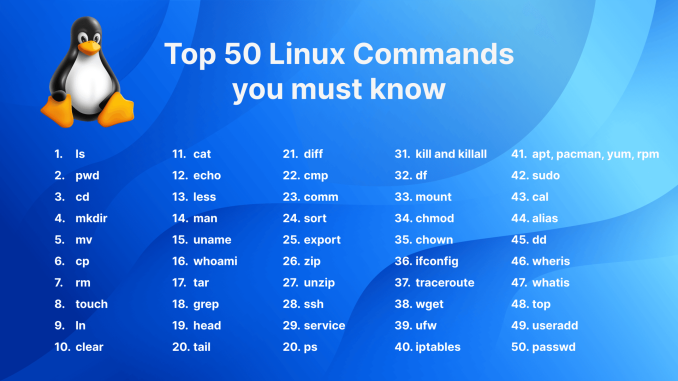
Are you new to Linux and feeling overwhelmed? Don’t worry! Linux may seem intimidating at first, but mastering some basic commands will make your journey smoother and more rewarding. Whether you’re looking to navigate the terminal, manage files, or monitor system performance, these essential commands will help you get started quickly.
1. Navigating the File System
- cd (Change Directory): Move between directories effortlessly.
cd /home/user/Documents
- ls (List Directory Contents): view files and directories in the current location.
ls -l
- pwd (Print Working Directory): see your current directory location.
pwd
2. Managing Files and Directories
- touch (Create a New File): quickly create an empty file.
touch newfile.txt
- mkdir (Make Directory): create a new directory.
mkdir myfolder
- rm (Remove Files or Directories): delete files or directories (be cautious with this!).
rm myfile.txt
rm -r myfolder
- cp (Copy Files or Directories): copy files from one location to another.
cp file1.txt /home/user/Documents/
- mv (Move/Rename Files): move files or rename them.
mv oldname.txt newname.txt
3. Viewing and Editing Files
- cat (View File Contents): display the contents of a file.
cat file.txt
- nano (Edit Files): A simple text editor for quick file modifications.
nano file.txt
4. System Monitoring and Management
- top (Monitor System Processes): see real-time CPU and memory usage.
top
- df (Check Disk Space): view available disk space.
df -h
- free (Check Memory Usage): see available and used memory.
free -m
5. User Management
- whoami (Identify Current User): find out which user is logged in.
whoami
- passwd (Change User Password): change your user password securely.
passwd
6. Network Commands
- ping (Check Network Connectivity): test connection to a website or IP address.
ping google.com- ifconfig / ip (Check IP Address): view network configurations.
ip a
7. Package Management (For Ubuntu/Debian-based systems)
- apt-get (Install Software): Install new software packages.
sudo apt-get install package-name
- apt-get update (Update Package Lists): update package repositories.
sudo apt-get update
In Conclusion, Learning Linux commands unlocks a whole new world of possibilities. With these basic commands, you’ll be well on your way to mastering Linux. Start experimenting, and soon you’ll navigate the terminal with confidence!
Ready to take your Linux skills to the next level? Keep exploring and practising new commands!

As a beginner here, I found this helpful and I know where to alway come for solutions.
If I have issues or encounter problems, can I reach out you you guys?
Absolutely! You can reach out to us at info@linuxit.io
echo “This is awesome! A great example for beginners in Linux Red Hat.”
This is very Educative and Informative. May God bless the writer of this blog and entire Linuxit Team